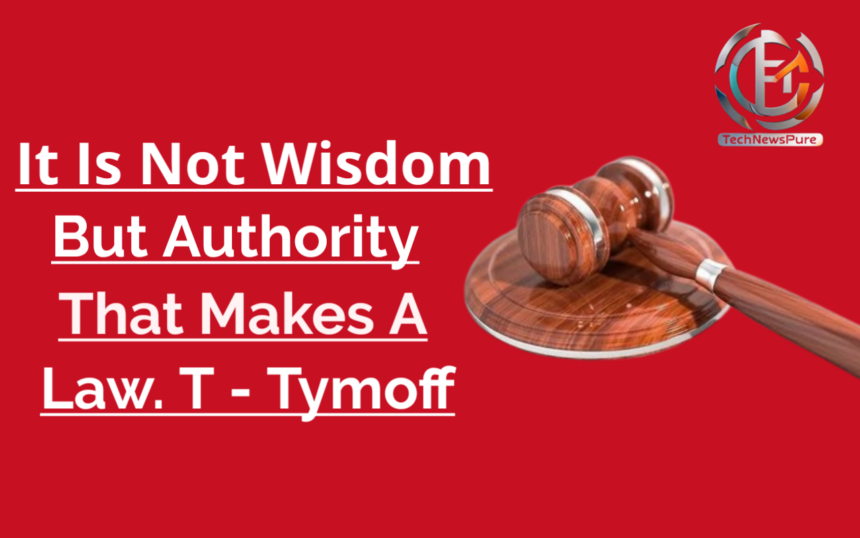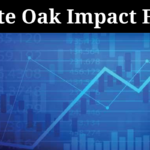In the world of law and governance, the interplay between wisdom and authority is a topic as old as civilization itself. The quote “It Is Not Wisdom But Authority That Makes A Law. T – Tymoff” encapsulates a striking reality of our legal systems. This blog post aims to shed light on this powerful statement, exploring its meaning, implications, and relevance in contemporary society.
What Tymoff’s Quote Really Means
The phrase speaks to the power dynamics in lawmaking. While wisdom suggests a deep understanding and judicious application of knowledge, authority represents the power to enforce rules. This statement suggests that laws are often established and upheld not necessarily because they are wise, but because they are backed by the power of authority.
Understanding Authority in Lawmaking
When we talk about authority in the context of laws and regulations, we refer to the legitimate power that individuals or institutions hold to create, enforce, and interpret laws. Authority is what ensures that laws are followed and respected by the society they govern. Without authority, even the wisest laws would lack the necessary force to be effective.
Authority in lawmaking can come from various sources. It can be vested in governmental institutions, such as legislatures and courts, or in figures such as police officers and judges. The essence of authority lies in its ability to compel obedience and compliance, making it a crucial element in the legal framework.
The Importance of Authority in Lawmaking
Authority plays a central role in driving the creation and enforcement of laws. While wisdom can guide the formulation of fair and effective laws, it is authority that ensures these laws are implemented and observed. The process of lawmaking involves not just the drafting of legislation but also its enactment and enforcement, tasks that require the presence of recognized authority.
In democratic societies, authority is typically derived from the consent of the governed. Elected officials, empowered by the electorate, possess the authority to create laws. This system ensures that laws reflect the collective will of the people, while also granting the necessary authority to enforce them. In contrast, authoritarian regimes may derive authority from centralized control, where power is concentrated in the hands of a few.
Wisdom and the Law
Wisdom is often seen as a guiding light in decision-making. In the context of law, wisdom involves understanding human nature, societal needs, and ethical considerations. Historical figures like Solomon, known for his wise judgments, exemplify how wisdom can lead to fair and compassionate laws. In contemporary times, judicial decisions often reflect a blend of legal knowledge and moral reasoning, showing that wisdom is still valued in the legal process.
However, wisdom alone cannot create or enforce laws. While it provides deep insights and ethical considerations, it lacks the formal power to make these ideas binding. This is where authority comes into play.
Authority and the Law
Authority in law refers to the power vested in individuals or institutions to make, enforce, and interpret laws. This authority is granted by society through mechanisms like elections, appointments, or traditional hierarchies. For instance, legislators have the authority to create laws, while judges have the authority to interpret them.
Public trust in this authority is crucial. When people believe in the legitimacy of the lawmakers and enforcers, they are more likely to comply with the laws. However, this trust can be fragile. Instances of corruption, abuse of power, or unjust laws can erode public confidence, leading to social unrest.
Wisdom vs. Authority in Lawmaking
Wisdom and authority are two sides of the coin in lawmaking. Wisdom involves deliberative processes, considering the long-term effects and ethical dimensions of laws. Authority, on the other hand, is about the capacity to establish and enforce laws, regardless of their inherent wisdom. This contrast is pivotal in understanding why some laws, although authoritative, may lack the nuance and fairness that wisdom could provide.
- Meaning and Implications of Wisdom
Wisdom in lawmaking implies foresight, ethical considerations, and a commitment to justice. A wise law addresses the root causes of issues and promotes the common good. However, wisdom alone lacks the enforcement power necessary for a law to be effective.
- Role of Authority
Authority, by contrast, entails the legitimacy and power vested in lawmakers and enforcers. Authority can impose laws swiftly and decisively, but without wisdom, these laws may be shortsighted or unjust.
Case Studies in Authority and Lawmaking
Historical Example
One notable historical example of the role of authority in lawmaking is the establishment of the Magna Carta in 1215. This document, forced upon King John of England by his barons, marked a significant shift in the balance of power. While the Magna Carta contained many wise provisions aimed at limiting the king’s arbitrary power, it was the barons’ authority and military might that compelled King John to sign it. Without their authoritative pressure, the Magna Carta’s wisdom alone would not have been enough to bring about change.
Contemporary Example
In a more contemporary context, consider the civil rights movement in the United States during the 1960s. The movement pushed for the passage of laws aimed at ending racial segregation and discrimination. While the moral wisdom of these laws was evident, it was the authority of figures like Martin Luther King Jr., combined with the political authority of elected officials, that propelled the Civil Rights Act of 1964 into law. The authority of the federal government ensured its enforcement, transforming societal norms and practices.
Public Perception of Authority
Public perception of authority significantly influences law enforcement and compliance. When people perceive authority as legitimate and just, they are more likely to comply with laws voluntarily. Conversely, if authority is seen as oppressive or unjust, compliance may diminish, leading to widespread civil disobedience and unrest.
Building public trust in authority requires transparency, accountability, and fairness. Authorities must demonstrate that laws are enforced impartially and in the public interest. For example, body cameras on police officers and independent oversight committees are measures that can enhance public trust in law enforcement, ensuring that authority is exercised responsibly.
Societal Impact of Authority-Driven Laws
Laws established on authority without wisdom can lead to a myriad of societal issues, including injustice and inefficiency.
- Injustice
Authority-driven laws can perpetuate injustice by failing to consider the diverse needs and rights of all individuals. Such laws may disproportionately affect marginalized communities, leading to systemic inequality.
- Inefficiency
Laws created without wisdom can be inefficient, failing to address the underlying issues they aim to solve. This inefficiency can result in increased costs, both financially and socially, as more resources are needed to enforce and rectify these laws.
Read More: Unraveling the Pastor Chris Hodges Scandal Lessons in Transparency and Grace
Balancing Wisdom and Authority for Just Laws
Creating just laws requires a delicate balance between wisdom and authority. One strategy is to ensure diverse representation in the lawmaking process. When different perspectives and expertise come together, the resulting laws are more likely to be wise and just. Public participation is also crucial. Engaging citizens in the legal process can provide valuable insights and build trust in the resulting laws.
Ethical decision-making must be at the heart of this process. Lawmakers should be guided not just by the authority they hold but by the wisdom of considering long-term impacts, moral values, and societal well-being. This integration can lead to laws that are not only enforceable but also respected and adhered to.
Practical Steps for Advocating Wise Lawmaking
Individuals and communities play a vital role in advocating for wise lawmaking. Here are practical steps to take.
- Stay Informed
Knowledge is power. Stay informed about current laws and proposed legislation. Understand their implications and engage in discussions about their wisdom and fairness.
- Participate in Public Consultations
Many governments hold public consultations on new laws. Participate in these consultations to voice your opinions and advocate for laws that balance authority with wisdom.
- Support Advocacy Groups
Join or support advocacy groups that work towards wise lawmaking. These groups often have the expertise and resources to challenge unjust laws and promote fair legislation.
Conclusion
In conclusion, the quote “It Is Not Wisdom But Authority That Makes A Law. T – Tymoff highlights a fundamental aspect of the legal landscape. Authority is the driving force behind the creation, enforcement, and compliance of laws. While wisdom guides the formulation of just and effective laws, it is authority that ensures they are respected and followed.
Understanding the role of authority in lawmaking is crucial for both legal professionals and the general public. It helps us appreciate the complexities of the legal system and the importance of balancing authority with innovation and public trust. By recognizing the interplay between authority and wisdom, we can work towards creating a legal framework that is both effective and just.
If you have any thoughts or insights on this topic, we encourage you to share them with us. Engaging in meaningful discussions can help us better understand and shape the role of authority in our legal system.



